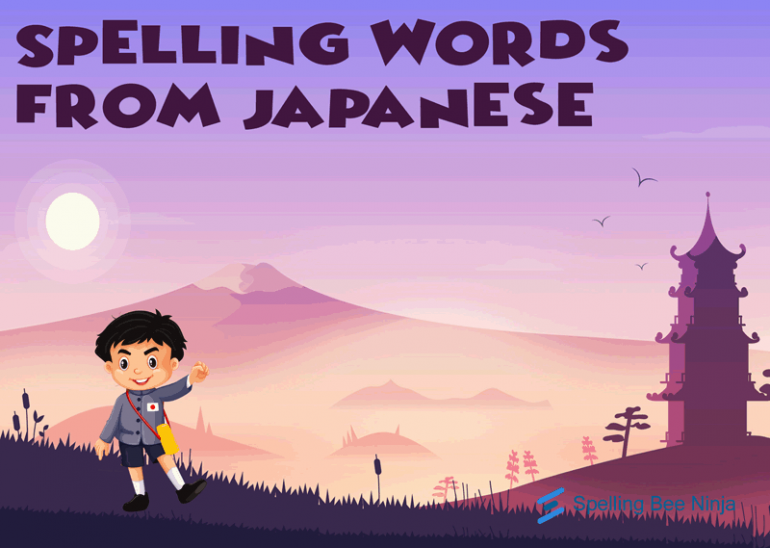When you look at the Japanese spelling words, you will see that you are familiar with a lot of them. This is not only because of your affection towards the Asian culture or your love of Anime. It also has to do with the fact that a lot of these words have been directly accepted into the English vocabulary.
The list below contains some of the spelling bee words coming from Japan which you might encounter in your next spelling bee.
You will find a lot of these words in different spelling bee word lists. Spelling bees like to incorporate words from different languages, origins, and culture. Hence, you are bound to run into one or more of these words at some point during your practice as well as during the competition.
PDF, Flashcards and SBN formats
 | > Japanese words in PDF Format |
 | > Japanese FLASHCARDS in PDF Format |
 | > Japanese spelling words with SBN APP |
Japanese Spelling Words
| Banzai | A Japanese battle cry. |
| Futon | A padded unsprung mattress originating in Japan, which can be rolled up or folded in two. |
| Geisha | A Japanese hostess trained to entertain men with conversation, dance, and song. |
| Geta | A type of Japanese wooden sandal. |
| Haiku | A Japanese poem of seventeen syllables, in three lines of five, seven, and five, traditionally evoking images of the natural world. |
| Hibachi | A portable cooking apparatus similar to a small barbecue. |
| Honcho | A leader or manager; the person in charge. |
| Issei | A Japanese immigrant to North America. |
| Kabuki | A form of traditional Japanese drama with highly stylized song, mime, and dance, now performed only by male actors, using exaggerated gestures and body movements to express emotions, and including historical plays, domestic dramas, and dance pieces. |
| Kami | A title given to the celestial gods of the first mythical dynasty of Japan and extended to the demigods of the second dynasty, and then to the long line of spiritual princes still represented by the Mikado. |
| Karaoke | A form of entertainment, offered typically by bars and clubs, in which people take turns to sing popular songs into a microphone over pre-recorded backing tracks. |
| Karate | An oriental system of unarmed combat using the hands and feet to deliver and block blows, widely practiced as a sport. |
| Kibei | A son or daughter of issei parents who is born in America and especially in the U.S. and educated largely in Japan. |
| Koan | A paradoxical anecdote or riddle without a solution, used in Zen Buddhism to demonstrate the inadequacy of logical reasoning and provoke enlightenment. |
| Kudzu | A quick-growing East Asian climbing plant with reddish-purple flowers, used as a fodder crop and for erosion control. |
| Kuruma | A Japanese cart |
| Meiji | The period when Japan was ruled by the emperor Meiji Tenno, marked by the modernization and westernization of the country. |
| Mikado | The popular designation of the hereditary sovereign of Japan. |
| Miso | Paste made from fermented soya beans and barley or rice malt, used in Japanese cooking. |
| Ninja | A person skilled in the Japanese art of ninjutsu. |
| Nisei | An American or Canadian whose parents were immigrants from Japan. |
| Odori | Any lively Japanese folk or theater dance characterized by rapid footwork. |
| Origami | The Japanese art of folding paper into decorative shapes and figures. |
| Ramen | (In Japanese cuisine) quick-cooking noodles, typically served in a broth with meat and vegetables. |
| Romaji | A system of Romanized spelling used to transliterate Japanese. |
| Samurai | A member of a powerful military caste in feudal Japan. |
| Sansei | An American or Canadian whose grandparents were immigrants from Japan. |
| Sashimi | A Japanese dish of bite-sized pieces of raw fish eaten with soy sauce and wasabi paste. |
| Satori | Sudden enlightenment. |
| Sayonara | Goodbye. |
| Shogun | A title originally conferred by the Mikado on the military governor of the eastern provinces of Japan. By gradual usurpation of power the Shoguns (known to foreigners as Tycoons) became finally the virtual rulers of Japan. The title was abolished in 1867. |
| Sukiyaki | A Japanese dish of sliced meat, especially beef, fried rapidly with vegetables and sauce. |
| Sumo | A Japanese form of heavyweight wrestling, in which a wrestler wins a bout by forcing his opponent outside a marked circle or by making him touch the ground with any part of his body except the soles of his feet. |
| Sushi | A Japanese dish consisting of small balls or rolls of vinegar-flavored cold rice served with a garnish of vegetables, egg, or raw seafood. |
| Tatami | A rush-covered straw mat forming a traditional Japanese floor covering. |
| Teriyaki | A Japanese dish consisting of fish or meat marinated in soy sauce and grilled. |
| Tofu | A soft white substance made from mashed soya beans, used chiefly in Asian and vegetarian cooking. |
| Tsunami | A long, high sea wave caused by an earthquake or other disturbance. |
| Tycoon | The title by which the shogun, or former commander in chief of the Japanese army, was known to foreigners. |
| Wasabi | A Japanese plant with a thick green root which tastes like strong horseradish and is used in cooking, especially in powder or paste form as an accompaniment to raw fish. |
These were the spelling words from Japan. Practice this list and move on to the next featured spelling bee word list.


